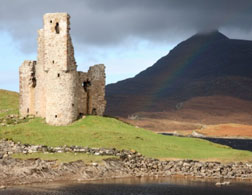English and Scottish Folk Ballads: Két holló (15. század) (The Twa Corbies (The Two Crows) in Hungarian)
|
The Twa Corbies (The Two Crows) (English)As I was walking all alane
|
Két holló (15. század) (Hungarian)Míg mentem vót az erdőn át, „Ott túl, hová az nap se ver, „Az eb jó vadat másnak hajt, „Te hószín nyakát vájjad szét, „Majd hallunk érte jajt, panaszt.
|



